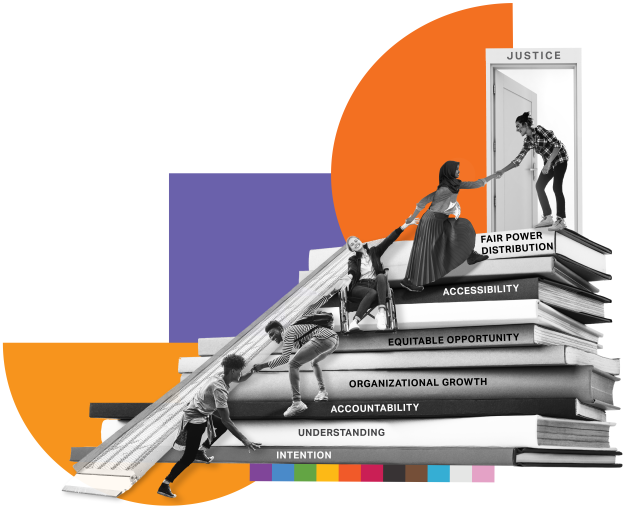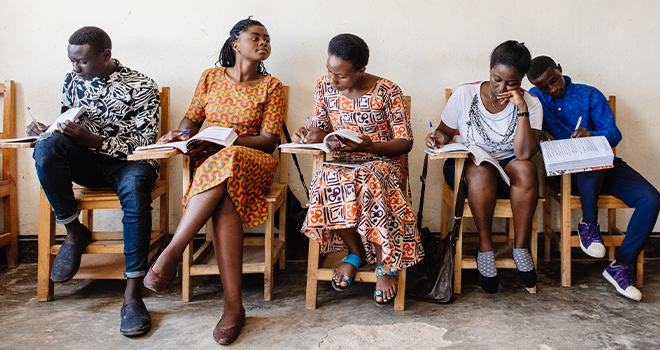
When equal expression, opportunity, and supports exist for all people, society can reach its full potential. Individuals are empowered. Communities can create enduring solutions to pressing problems. Nations can foster peace.
We have seen the impacts of inequity all around the globe—a lack of access to health and education services resulting in hampered skills development, a lack of social mobility, and declines in civic engagement, all of which are critical factors in achieving peace, prosperity, and the promise of a just society.
Since 1958, EDC’s mission has been to improve health, education, and economic opportunity around the world. That mission guides us to work in difficult contexts where the lack of access to resources and inequity directly imperil progress. We do this work for a simple reason—because only through building equitable systems can we have a lasting impact on individuals, communities, and the world.
Equity is a focus on access to opportunity and places an emphasis on fairness and justice. Diversity is recognition and celebration of difference. Inclusion is when people with different identities are valued.
Our Guiding Principles
We have developed four principles for our work, which are based upon extensive research and our own experience:
- Equity ensures fair distribution of opportunity and power. Our goal of equity is for individuals to have the fullest possible engagement in their communities, society and nations. For us to achieve this goal, historically excluded groups must have a central voice and role in efforts to address inequity and injustice.
- Equity requires understanding. Change is most possible when we understand how exclusion occurs, how it can be addressed, and how ensuring equal opportunities can facilitate every person in reaching their full potential, especially those who are systemically excluded.
- Equity is intentional and requires accountability. Once we identify practices of exclusion, we must develop and implement inclusive policies, frameworks and practices to ensure inclusive and equitable partnership and voice.
- Equity is essential to resilient individuals and societies. Supporting and recognizing community-led efforts increases individuals’ trust and strengthens their bonds to community and society, offering new resources and opportunities.
What Is Unique about EDC’s Approach?
Our commitment to equity involves not just what we do, but how we do it. At EDC, our approach is distinctive because we:
- Build deep relationships with our partners and work with them to break down barriers to reach the underserved and improve coordinated services
- Ensure that our programs are equitably implemented and do not exacerbate existing inequities
- Learn about existing challenges and opportunities and innovate to leverage opportunities and address those challenges in partnership with stakeholders
- Use culturally responsive monitoring and evaluation to inform our decisions, build local capacity, stimulate learning, and improve performance
- Implement projects at multiple levels because equity can only exist when change is implemented across systems: from classrooms to school systems, from community health clinics to state health systems, and from regional improvements to nationwide reforms
This commitment is also reflected in the individuals at EDC who do that work. We promote a diverse and inclusive workplace, support career paths that expand opportunity for all staff within the organization, and work intentionally to attract diverse talent.
Our Approach and Principles in Action
EDC works around the world— in active conflict and post-conflict zones, in traditionally resource-deprived neighborhoods, and among communities that have experienced sustained discrimination and repression. Over the years, our programs have:
- Pioneered gender equity in education. For more than 25 years, the Women’s Educational Equity Act Center supported 750 field-based projects in their work to promote gender bias-free education and to increase educational opportunities and outcomes for all students, believing that gender equity works for everyone—women and girls, men and boys.
- Broadened participation in STEM. Since 2003, the STEM Learning & Research Center has provided technical assistance to support the work of close to 450 National Science Foundation-funded projects working across the United States to broaden participation in STEM education and in the workforce. Together, these projects have collectively impacted nearly 1 million youth, 50,000 educators, and 10,600 parents and caregivers from underserved communities.
- Prepared undereducated youth for work success. EDC’s Work Ready Now! (WRN!) delivers relevant and effective work readiness training to youth, including young people who have dropped out of school or have never been to school, giving them a second chance at economic success. Since 2007, WRN! has been implemented in over 25 countries and translated into 19 languages, reaching more than 500,000 youth. Seventy percent of the youth involved have successfully secured employment or started their own business.
- Engaged women veterans with mental health care and other support services. Women Vets on Point is a pilot program using digital outreach and in-person case management to engage hard-to-reach women veterans in Los Angeles. Over a nine-month period, the program received over 11,000 unique visitors to its website, with 180 women completing the intake process and seeking help.
- Prevented suicide at scale. The Suicide Prevention Resource Center (SPRC) works to break down barriers facing individuals at risk for suicide, including veterans, American Indians, Alaska Natives, and older adults. SPRC has equipped over 50,000 mental health providers with improved skills in caring for their patients at risk for suicide and reached 44,000 clinicians with its online course “Counseling on Access to Lethal Means.”
- Improved educational outcomes for all students. During the past 15 years, EDC’s Regional Educational Laboratory Northeast & Islands has conducted research and provided technical assistance to several U.S. states and districts to improve equitable educational outcomes for a diverse range of students, including English learners, those with disabilities, those living in high-poverty communities, and those in urban and rural communities. This work comprises 65 research studies, surveys, and toolkits as well as more than 100 workshops.
- Engaged youth in computer science. EDC helped to implement the AP computer science course “Beauty and Joy of Computing,” in over 100 New York City high schools to better engage students underrepresented in computer science. In just two years, the number of girls taking an AP computer science test in NYC increased more than five-fold, and the number of girls passing an AP computer science exam increased 56 percent.
Creating a Better Future Together
Promoting equity is crucial for organizations, governments, and public and private partners seeking to have a lasting impact in the work they do. Equity is central to long-term change through its ties to efficiency, growth, poverty reduction, and social cohesion. More importantly, equity is critical for the individuals, communities, and nations that we work with, as it is the key to their ability to continue to shape their own destinies. By placing equity at the center of our work, we stand together with them in implementing the necessary policies and systems for all to thrive and realize a better future.

